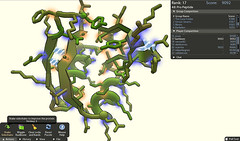Molecular Structure of Retrovirus Enzyme Solved, Doors Open to New AIDS Drug Design
Gamers have solved the structure of a retrovirus enzyme whose configuration had stumped scientists for more than a decade. The gamers achieved their discovery by playing Foldit, an online game that allows players to collaborate and compete in predicting the structure of protein molecules.
After scientists repeatedly failed to piece together the structure of a protein-cutting enzyme from an AIDS-like virus, they called in the Foldit players. The scientists challenged the gamers to produce an accurate model of the enzyme. They did it in only three weeks.
This class of enzymes, called retroviral proteases, has a critical role in how the AIDS virus matures and proliferates. Intensive research is under way to try to find anti-AIDS drugs that can block these enzymes, but efforts were hampered by not knowing exactly what the retroviral protease molecule looks like.
“We wanted to see if human intuition could succeed where automated methods had failed,” said Dr. Firas Khatib of the University of Washington Department of Biochemistry. Khatib is a researcher in the protein structure lab of Dr. David Baker, professor of biochemistry.
Remarkably, the gamers generated models good enough for the researchers to refine and, within a few days, determine the enzyme’s structure. Equally amazing, surfaces on the molecule stood out as likely targets for drugs to de-active the enzyme.
“These features provide exciting opportunities for the design of retroviral drugs, including AIDS drugs,” wrote the authors of a paper appearing Sept. 18 in Nature Structural & Molecular Biology. The scientists and gamers are listed as co-authors.
This is the first instance that the researchers are aware of in which gamers solved a longstanding scientific problem.
Bookmark this page for “gamers doing science” and check back regularly as these articles update on a very frequent basis. The view is set to “news”. Try clicking on “video” and “2” for more articles.
>








